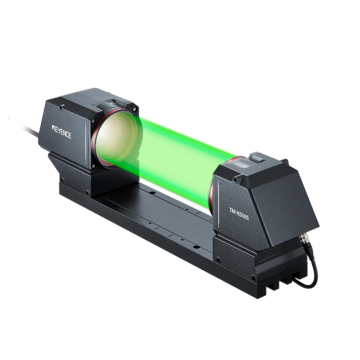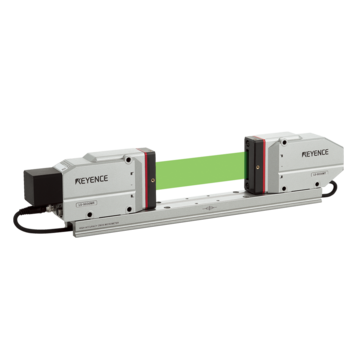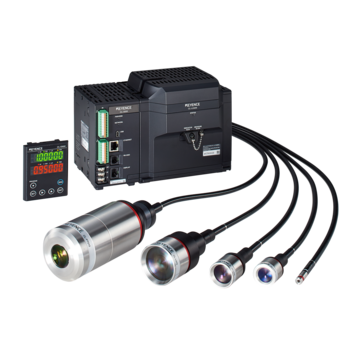Measurement Sensors
- 2D/3D Laser Profiler LJ-X8000 series
- High-speed 2D Laser Profiler LJ-V7000 series
- 2D Laser Displacement Sensor LJ-G5000 series
- Confocal Displacement Sensor CL-3000 series
- Ultra High-Speed/High-Accuracy Laser Displacement Sensor LK-G5000 series
- High-Speed, High-Accuracy CCD Laser Displacement Sensor LK-G3000 series
- Image-Based Laser Sensor IX series
- CMOS Multi-Function Analog Laser Sensor IL series
- Telecentric Measurement System TM-X5000 series
- High-speed optical micrometer LS-9000 series
- High-speed 2D Optical Micrometer TM-3000 series
- High-speed, High-accuracy Digital Micrometer LS-7000 series
- Multi-Purpose CCD Laser Micrometer IG series
- Thrubeam Type Laser Detection Sensor IB series
- 3D Interference Measurement Sensor WI-5000 series
- Micro-head Spectral-interference Laser Displacement Meter SI-F series
- Spectral-Interference Wafer Thickness Meter SI-F80R series
- High-speed, High-Accuracy Digital Displacement Inductive Sensor EX-V series
- Inductive Gauging Sensor AS series
- High-accuracy Positioning Sensor EG series
- High-Accuracy Digital Contact Sensor GT2 series
- General Purpose Digital Contact Sensor GT series
Dimension Measurement
Displacement Measurement
- Measurement Sensors for the Medical and Pharmaceutical Industry
- Measurement Sensors for the Fiber Optic/Cable Industry
- Measurement Sensors for the Film and Sheet Industry
- Measurement Sensors for the Electric Vehicle Industry
- Measurement Sensors for the Semiconductor Industry
- Measurement Sensors for the Electronics Systems Industry
- Measurement Sensors for the Food and Beverage Industry
- Measurement Sensors for the Automotive Manufacturing Industry
- Measurement Sensors for the Metal and Steel Industry
Measurement Sensors for the Medical and Pharmaceutical Industry
The integration of advanced measurement sensors and systems into the medical and pharmaceutical industry ensures the safety, efficiency, and quality of healthcare. The fact that even the most minute deviation in medical devices can often mean the difference between life and a fatal outcome only underscores the importance of precise measurement.
To ensure high levels of precision and accuracy, the medical and pharmaceutical industry relies on precise measurement sensors for various inspections and quality control checks. A high level of precision significantly affects the reliability of both medical equipment and pharmaceutical products, which in turn improves patient outcomes.
Importance of Precision Measurements in the Medical and Pharmaceutical Industry
As stated, precision is crucial in the medical and pharmaceutical industry, and even the slightest deviation in the dimensions or composition of equipment and drugs can lead to disastrous results. Because of that, the industry demands adherence to strict standards and protocols that ensure that each product is of the highest possible quality and safety specification.
Measuring sensors, such as thrubeam sensors and 2D/3D profilers, are therefore necessary to achieve higher levels of precision. They allow manufacturers to control the production process and ensure unparalleled quality control of their products.
Medical Device and Syringe Inspection
The production of medical devices — such as needles, syringes, scalpels, and precision tweezers — often involves intricate designs that demand precision. Measurement sensors are often used for quality control purposes, such as measuring the dimensional accuracy of syringes, the shape and dimensions of injection needle tips, and the shape and dimensions of other devices.
These sensors ensure that the defective products get redirected on the production line long before they reach the packaging stage. Ampoule and vial dimensional inspection is also performed using sensors such as an optical micrometer.
Pill and Tablet Inspection
In pharmaceuticals, precision measurement sensors inspect several different aspects of pills and tablets—most notably their size, weight, and composition standards. These ensure the chemical uniformity and consistency of the product; laser sensors and machine vision are particularly useful in discerning misshaped, discolored, and inadequately coated pills and tablets.
Medical Equipment and Component Inspection
Medical equipment, ranging from mere tools to complex machines, also undergoes thorough inspections. These inspections rely on precise measurement sensors, which ensure that all the equipment and components meet specified requirements and tolerances necessary for the proper functioning of said equipment.
Integrating Measurement Sensors into Medical and Pharmaceutical Inspection Processes
Integrating measurement sensors into the medical and pharmaceutical inspection process ensures that the products adhere to strict industry standards and are thus safe to use.
If you’re looking to integrate measurement sensors, KEYENCE has you covered. The TM-X5000 Series of thrubeam micrometer sensors is capable of providing fast and accurate measurements by capturing the silhouette of a target object, which is particularly useful in ampoule integrity verification and needle quality control.
Other sensors, such as the LK-G5000 Series, are often used to measure the uniform thickness of IV bags, while the LJ-X8000 Series often finds its use in pharmaceutical industries, where it inspects blister packaging for tears of missing tablets.
Interested in streamlining your medical and pharmaceutical inspection processes? Look no further than KEYENCE's range of measurement sensors. From thrubeam micrometers to laser displacement sensors, we have the perfect solution for you! Contact KEYENCE today to find out more!
Related Products
Applications
Dimension Measurement
Displacement Measurement
Profile Measurement
Industries
- Measurement Sensors for the Medical and Pharmaceutical Industry
- Measurement Sensors for the Fiber Optic/Cable Industry
- Measurement Sensors for the Film and Sheet Industry
- Measurement Sensors for the Electric Vehicle Industry
- Measurement Sensors for the Semiconductor Industry
- Measurement Sensors for the Electronics Systems Industry
- Measurement Sensors for the Food and Beverage Industry
- Measurement Sensors for the Automotive Manufacturing Industry
- Measurement Sensors for the Metal and Steel Industry

![Automated Measurement and Inspection Examples [Medical Devices]](/img/asset/AS_119876_L.jpg)
![TM-X5000 Series Application Guide [Medical Devices]](/img/asset/AS_126582_L.jpg)


